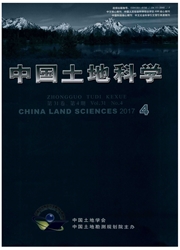

 中文摘要:
中文摘要:
研究目的:利用江西省东北部丘陵山区水稻种植农户的调查数据实证分析农业劳动力老龄化对土地利用效率的影响。研究方法:文献分析法,随机前沿生产函数,Tobit模型。研究结果:(1)农业劳动力老龄化可通过直接效应和间接效应两个途径影响农户的土地利用效率;(2)在非农就业水平较高的村庄内,老年劳动力比年轻劳动力具有更高的土地利用效率,但是在非农就业水平较低的村庄内,劳动力老龄化对土地利用效率的影响并不显著。研究结论:短期内,丘陵地区农业劳动力老龄化并不会造成土地利用效率的急剧下降,当前亟需通过引导长期从事兼业生产的年轻农户退出土地和提高年轻的务农农户的农业生产技能以提高江西省丘陵地区的土地利用效率。
 英文摘要:
英文摘要:
This paper employs the household data collected from rice production farmers in the northeastern hilly area of Jiangxi Province and methods of literature review, SFA and Tobit Model to empirically examine the impact of labor force aging on land use efficiency. The theoretical analysis indicates the aging of agricultural labor force has an impact on land use efficiency through direct effect and indirect effect. The aging of agricultural labor force increases land use efficiency in villages with higher non-agricultural employment ratio, but does not affect significantly land use efficiency in villages with lower non-agricultural employment ratio. In the short period, the aging of agricultural labor force will not decrease land use efficiency sharply. The policy implication is to guide young farmers with higher non-agricultural employment ratio to rent land out and young farmers with lower non-agricultural employment ratio to improve their agricultural production skills in the hilly area of Jiangxi Province.
 同期刊论文项目
同期刊论文项目
 同项目期刊论文
同项目期刊论文
 期刊信息
期刊信息
